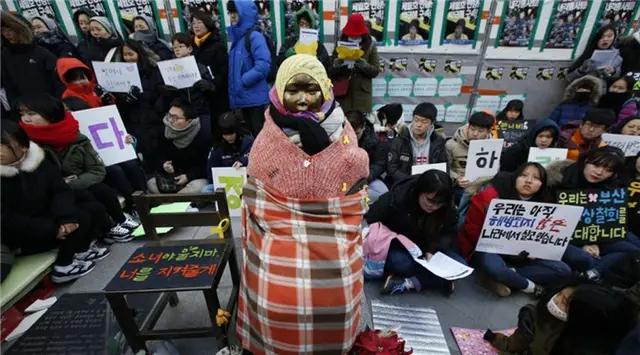Japanese Foreign Minister Fumio Kishida described as “unacceptable” on Tuesday a plan by a group of South Korean local assembly members to erect a “comfort women” memorial statue on an uninhabited pair of islets in the Sea of Japan (East Sea) controlled by South Korea but claimed by Japan.
The assembly members announced on Monday they plan to erect the statue on the islets – called Dokdo in South Korea and Takeshima in Japan – according to South Korean media, following weeks of heightened tensions over the issue of the women procured for Japanese military brothels before and during the second world war.
“In the first place, Japan’s position is that Takeshima is our inherent territory, both under international law and historically,” Kishida told a press conference. “In light of this position, we cannot accept [the plan],” Kishida said.
A statue dedicated to the women outside Japan’s embassy in Seoul, depicting a girl in traditional Korean clothing sitting beside an empty chair, has irked Japan since it was erected in 2011.
In a landmark bilateral deal in December 2015, aimed at settling the comfort women issue, South Korea said it would “strive to solve” the matter of the Seoul statue “in an appropriate manner.”
Japanese Foreign Minister Fumio Kishida. Photo: EPA
But tensions flared following the erection late last month of a statue of the same design in front of the Japanese consulate general in the southern port city of Busan. In response, Japan recalled its ambassador, who is yet to return to South Korea.
South Korea promptly lodged a protest against Kishida’s remarks on Tuesday, with Foreign Ministry spokesman Cho June-hyuck saying it was “deeply deplorable that Japan, once again, made the unjust [territorial] claim”.
Speaking at a press briefing, Cho urged Japan to “halt repeating the futile claim over the territory, which is clearly an integral part [of South Korea]”.
The assembly members from Gyeonggi Province in South Korea’s northwest said they will raise funds for the statue, aiming to erect it on the tiny islets by December this year, according to South Korean media reports.
Many of the women procured for Japanese military brothels were from the Korean Peninsula, which was under Japanese rule from 1910 to 1945. A Japanese government study in the early 1990s concluded that many of the women were recruited against their will.
(KYODO)
 简体中文
简体中文



